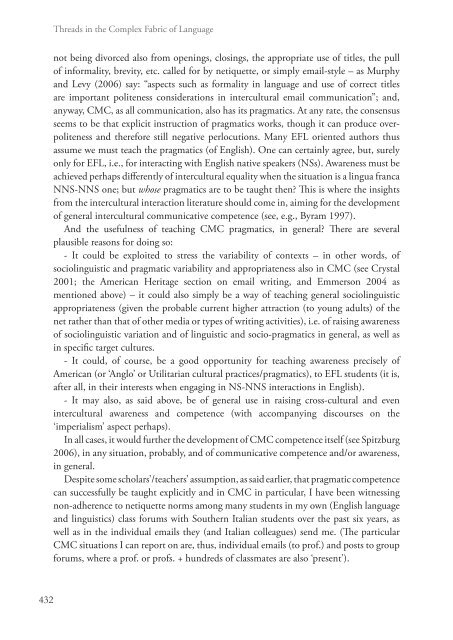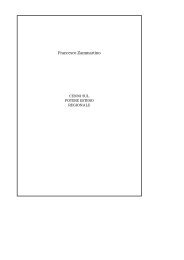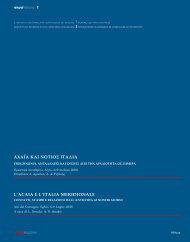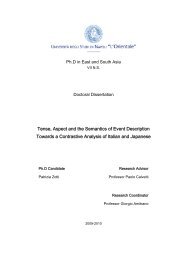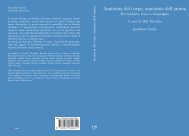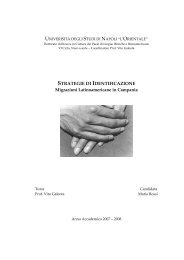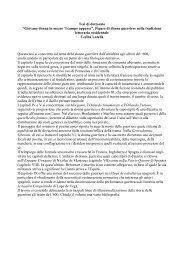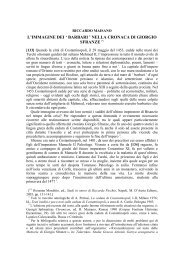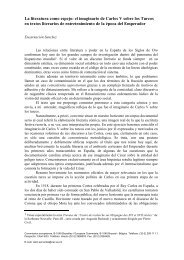Netiquette rules, OK! - OPAR L'Orientale Open Archive
Netiquette rules, OK! - OPAR L'Orientale Open Archive
Netiquette rules, OK! - OPAR L'Orientale Open Archive
- No tags were found...
Create successful ePaper yourself
Turn your PDF publications into a flip-book with our unique Google optimized e-Paper software.
Threads in the Complex Fabric of Languagenot being divorced also from openings, closings, the appropriate use of titles, the pullof informality, brevity, etc. called for by netiquette, or simply email-style – as Murphyand Levy (2006) say: “aspects such as formality in language and use of correct titlesare important politeness considerations in intercultural email communication”; and,anyway, CMC, as all communication, also has its pragmatics. At any rate, the consensusseems to be that explicit instruction of pragmatics works, though it can produce overpolitenessand therefore still negative perlocutions. Many EFL oriented authors thusassume we must teach the pragmatics (of English). One can certainly agree, but, surelyonly for EFL, i.e., for interacting with English native speakers (NSs). Awareness must beachieved perhaps differently of intercultural equality when the situation is a lingua francaNNS-NNS one; but whose pragmatics are to be taught then? This is where the insightsfrom the intercultural interaction literature should come in, aiming for the developmentof general intercultural communicative competence (see, e.g., Byram 1997).And the usefulness of teaching CMC pragmatics, in general? There are severalplausible reasons for doing so:- It could be exploited to stress the variability of contexts – in other words, ofsociolinguistic and pragmatic variability and appropriateness also in CMC (see Crystal2001; the American Heritage section on email writing, and Emmerson 2004 asmentioned above) – it could also simply be a way of teaching general sociolinguisticappropriateness (given the probable current higher attraction (to young adults) of thenet rather than that of other media or types of writing activities), i.e. of raising awarenessof sociolinguistic variation and of linguistic and socio-pragmatics in general, as well asin specific target cultures.- It could, of course, be a good opportunity for teaching awareness precisely ofAmerican (or ‘Anglo’ or Utilitarian cultural practices/pragmatics), to EFL students (it is,after all, in their interests when engaging in NS-NNS interactions in English).- It may also, as said above, be of general use in raising cross-cultural and evenintercultural awareness and competence (with accompanying discourses on the‘imperialism’ aspect perhaps).In all cases, it would further the development of CMC competence itself (see Spitzburg2006), in any situation, probably, and of communicative competence and/or awareness,in general.Despite some scholars’/teachers’ assumption, as said earlier, that pragmatic competencecan successfully be taught explicitly and in CMC in particular, I have been witnessingnon-adherence to netiquette norms among many students in my own (English languageand linguistics) class forums with Southern Italian students over the past six years, aswell as in the individual emails they (and Italian colleagues) send me. (The particularCMC situations I can report on are, thus, individual emails (to prof.) and posts to groupforums, where a prof. or profs. + hundreds of classmates are also ‘present’).432


